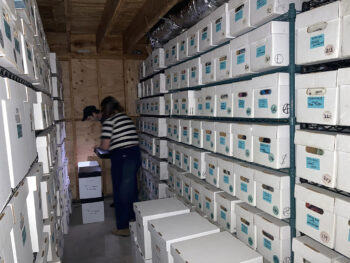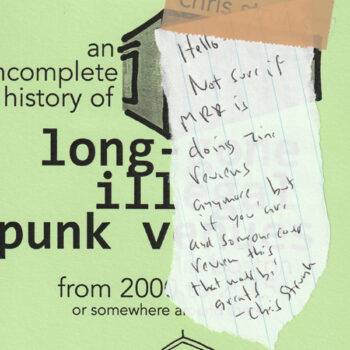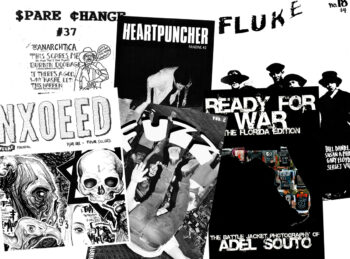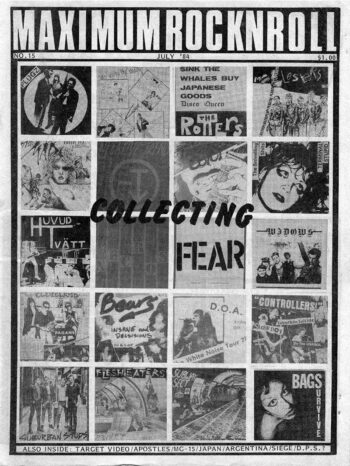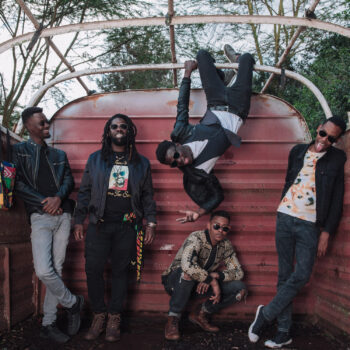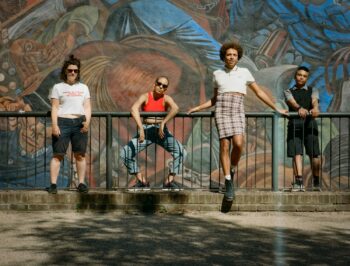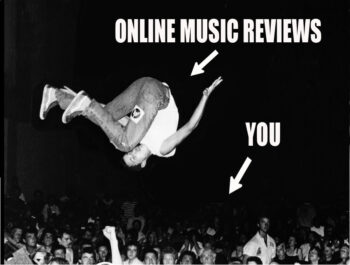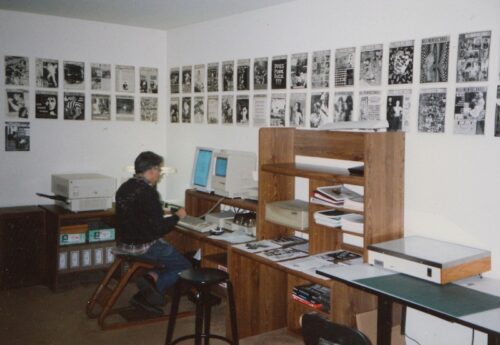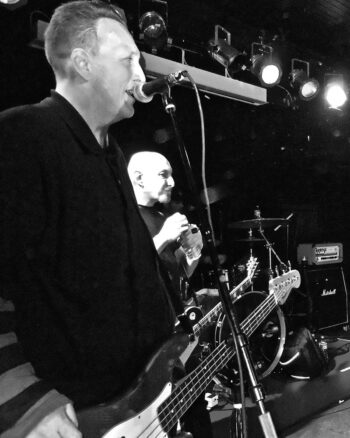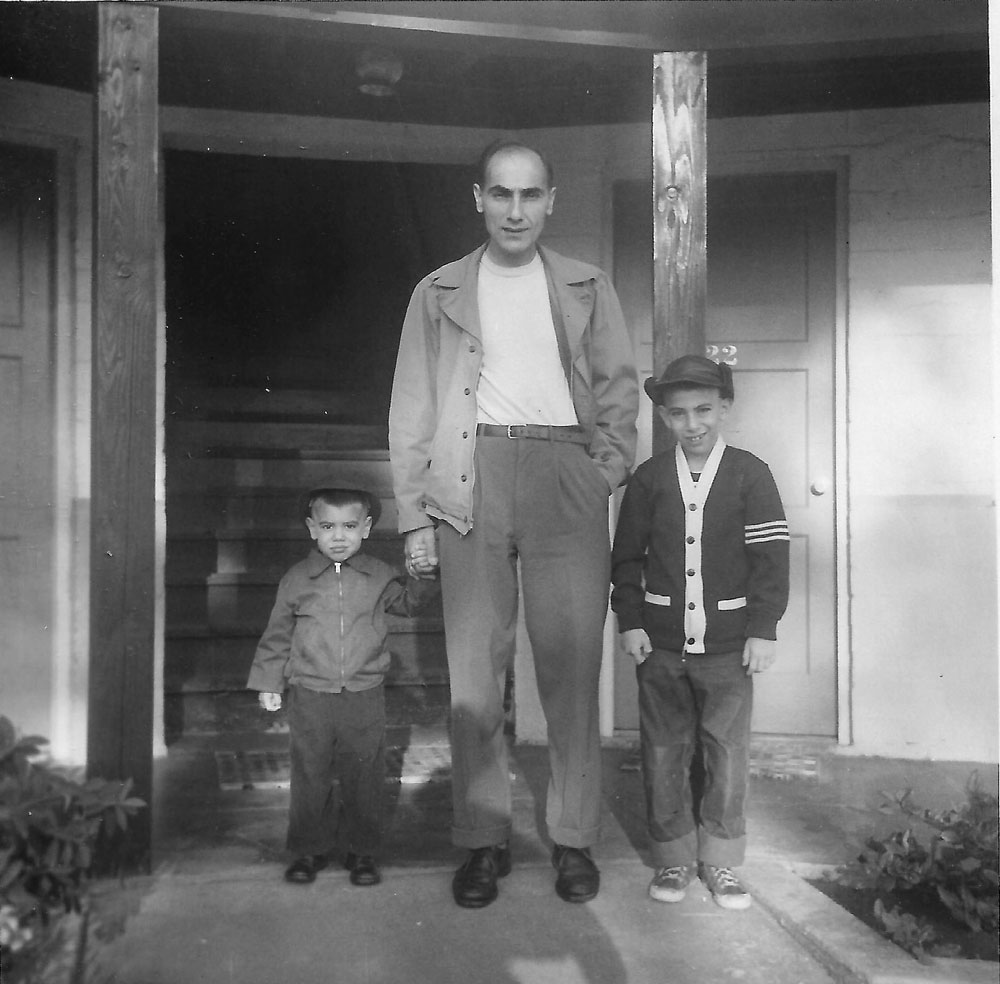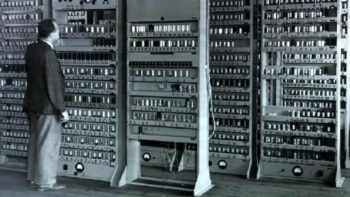Blast From the Past: Coke Bust
This originally ran in MRR #314/July ’09. which is now out of print
Coke Bust is a Washington DC hardcore band whose music draws primarily from mid-’80s European thrash, a la Heresy and Ripcord, as well as the better corners of the youth crew genre, creating a sound that brings bands such as Scholastic Deth or Betercore to mind. As an open-minded yet firmly identified straightedge band at a time when having such ethos (or having any ethos, really) is at its most uncool, they dig deeper than the usual slogans and trappings of “straightedge hardcore,” writing songs that take on topics such as the less obvious outcomes of drug and alcohol culture, as well as the lesser-known implications of the “war on drugs,” including the US-backed aerial spraying of coca crops in South America. Their output so far includes their demo 7” that they’d rather you pass over in favor of their Fuck Bar Culture 7″, and they are also releasing an LP titled Lines in the Sand, which will be out by the time that you read this. They’ve also planned a six-week US tour in July. Nick does vocals, Jeremy plays guitar, Jubert plays bass, and Chris spreads himself pretty thin but never slacks on his drum duties.
Interview by Dan Goetz.

MRR: How exactly did the band get together? Nick and Chris, I know you two were in Griptape a few years earlier…did Coke Bust form so you two could play in a band together again?
Chris: Nick and I did play in a band called Griptape when we were in high school. After that band broke up Nick started another band called Bail Out!, and they played for a little while but me and Nick always liked playing music together, so it was inevitable that we’d start another band.
Nick: For a time, Parsons, Chris, and I were jamming and we couldn’t find someone to play guitar, so Parsons suggested Jeremy. He was this older guy in the scene who had already been in a bunch of bands. We didn’t know him that well, but we knew that he was a nice guy and liked good music, so we asked him on a whim, and it turned out to work out great.
Jeremy: Parsons came up to me at my previous band’s last show and said that he was jamming with Nicktape and that it was going to be short, fast hardcore punk and asked if I wanted to do it. I had nothing going on so I said, “Yes, let me know when you guys want to try to get something together.” A couple of months later Parsons called me, so I showed up and we wrote three songs in one day!

MRR: How’d you find the new guy?
Nick: Well, our old bass player, Parsons, wasn’t able to play in the band anymore due to the fact that he was living in Richmond, Virginia [two hours south of DC] and I think he had a lot on his plate. So I was at a show that Jubert [the new guy] was at and he was like, “Hey man, you should let me play bass,” and he came and jammed with us. He rules. He’s still in high school, too!
Jeremy: It wasn’t working out with him, and it was pretty mutual. He wasn’t making the commute and contributing as much as he used to, so we just kind of all decided separately that it’d be best to part ways, so we found ourselves without a bass player, and someone mentioned Jubert’s name and that he was a good bass player.
Nick: And he’s straightedge too.
Jeremy: Yes, he fit the criteria.

MRR: What are some of your influences, including some of your less obvious ones? How do you go about writing songs? The first 7″ alternates between youth crew and Heresy-sounding stuff, and I can catch hints of Bail Out! and Magrudergrind, while the second 7″ has a more cohesive, fused-together sound that always struck me as a more youth crew Scholastic Deth.
Chris: I think that from the beginning, we had a general idea of what we wanted the band to sound like. We all kind of came to practice and were like, “We all like Heresy; we want to start a really fast hardcore band,” and I don’t think it was really a coincidence that the band was straightedge. I think it was all in the back of our minds when we were getting together, and I think we actively sought out other people who were straightedge to be in a band. DC has a long history of straightedge, and there really aren’t that many straightedge kids in DC, or at least when we started the band, and there’s not a “straightedge” scene in this area.
Nick: We just wanted to play fast, and we wanted to have a youth crew edge, because we all dig that shit too. Jeremy?
Jeremy: I would say from the beginning, it was in the back of everyone’s mind that we wanted to play fast. I can speak for myself with all the riffs, ideas, and songs I brought in that I think we were just kind of feeling each other out, so I don’t feel that the first record had a terribly cohesive sound, whereas I know on Fuck Bar Culture we kind of knew what we wanted to do. We’d already done a tour or two together, so we were more comfortable playing and it just came out that way. It needed to be a little more pissed sounding than the last record, so we just upped the ante on ourselves.
Chris: Can I also note that our first 7″ was supposed to stay a demo. We made like 100 CD-Rs with crappy folded inserts for our first few shows, and we made some tapes, and it was supposed to stay like that, but Bobby Egger from Headcount Records insisted that the demo go on 7″. I think that was the stupidest idea ever. [laughter] But we still love you Bobby!
Nick: Those demos we made for our first show were some straight-up Crayola-lookin’ joints.
MRR: That makes sense. I’ve noticed in listening to the Cycle of Violence songs [that would eventually be for the LP], it almost seems like you’re expanding on both parts, like it’s split apart again, but the songwriting is definitely improved in both the youth crew parts and the thrashier parts.
Nick: Yeah, that shit is cool.
 MRR: As far as straightedge, or sobriety, or what-have-you, where exactly does this come from for all of you?
MRR: As far as straightedge, or sobriety, or what-have-you, where exactly does this come from for all of you?
Chris: At a really early age I had problems with drugs and alcohol, and drug and alcohol addiction ran in my family. My dad was an alcoholic and my mom was a drug addict, so I feel like I inherited a lot of those traits, but didn’t really pay attention to them. I was just kind of floating through life and eventually I became a really shitty person. I was shitty to my friends, I couldn’t keep a job, I couldn’t stay in school, and more importantly I wasn’t there as much as I could have been for my mother, who was bed ridden for almost all of high school. The one thing that got me out of that slump was punk, and when I was fucked up all the time I didn’t really care about it. I only really had one straightedge friend in high school, his name was Rudy, and if it wasn’t for him and punk I would still be a shitty person. That’s why I’m straightedge.
Jeremy: I remember being younger and getting into punk, I had some friends that threw around, “I’m straightedge, I’m straightedge. I don’t do drugs.” I did experiment with alcohol at an early age, and I realized it wasn’t for me and that it wasn’t something I wanted to do, but I didn’t label myself “straightedge,” I always thought it was kind of silly. But when I got older, I kind of realized that it’s kind of empowering. I don’t do it, and especially in high school I lost a lot of good friends who started experimenting with alcohol and drugs out of sheer boredom. So I guess in rebellion to my friends I started considering myself straightedge and I kind of adopted the mantle of beliefs that I already upheld. It’s just something I stuck with for many years, and it seems like something I want to try, to keep myself with a clear head and not fall into addiction like most of my family. I’ve had a lot of alcoholism in my family, and I know that I’ve got a fairly obsessive personality, and all it would take would be a couple drinks and a few non-supportive friends and I’d be a complete fucking drunk that would never leave my house and barely socialize with anybody. It kind of scares me, so, nah, I’ll stay away from all that. If drinking is your thing, that’s fine, knock yourself out, but it’s not my thing. Don’t shove your views on me, I won’t shove my views on you.
Jubert: Drinking and smoking and doing drugs is never what I wanted to do, and when I found out there were people involved in punk who also didn’t want to do those things, I was pretty stoked, and I started calling myself straightedge. I’ve been to a lot of boring parties and I can safely say that it’s something I don’t want any part of.
Nick: I never wanted to do drugs or drink even before I got into punk, and then once I did get into punk and I saw that there were bands that I like that reinforced all that stuff, I got pretty stoked. That’s kind of the reason I wanted to be in a straightedge band—I thought it’d be cool if I could take part in possibly being in one of those bands that some newer kid listens to and gets stoked on. And I just don’t do drugs because they’re filthy, man.

MRR: Given DC’s straightedge hardcore history, were all of you able to find a crowd of like-minded people, and were you able to find this outside of, say, your stereotypical youth crew scene?
Chris: Personally, I especially noticed more of connection to the DC hardcore scene when Coke Bust and [Chris and Jeremy’s other band] Sick Fix started, as far as straightedge stuff is concerned. I feel like once we were playing out, more straightedge kids started coming to shows, and I started meeting more straightedge kids in our area.
Jeremy: It’s kinda weird, I feel like DC’s always misrepresented as some Mecca of straightedge. Yeah, Minor Threat was from DC, Ian MacKaye started the straightedge phenomena, but I really can never think of a loud, in-your-face contingent of straightedge bands around. Yeah, a lot of the early Dischord bands are associated with straightedge, but I never felt like it was a defining part of the DC sound. When you think about early Boston, you think of SSD, DYS, and a very militant “we’re a straightedge band” scene. And then of course you have the late ’80s with the youth crew in New York. DC always had a fair amount of straightedge kids, and there were straightedge bands that came and went, but I’ve seen people out of town come and kinda get bummed when it seems like half the scene drinks and smokes and the other half is a fairly laid back, non-confrontational straightedge contingent, and that’s always been my view on DC. I agree with Chris that since Coke Bust and Sick Fix started playing out, I’ve definitely seen a resurgence in DC straightedge. It really took a backseat for a decent number of years. There weren’t many straightedge bands, and there weren’t many people saying, “We’re straightedge, our band’s straightedge singing straightedge songs.”
Chris: One thing I’ve always noticed in DC is that there’s never really been a divide between straightedge people and non-straightedge people. Everyone in DC seems to co-exist to a certain extent. For example, this weekend I’m doing a show with Sick Fix and an indie-pop band, a garage band, and a pop-punk band. I feel like in a lot of cities a show like that could not go down without there being some sort of confrontation or some sort of issues between the variety of sub-sub-subcultures of punk, and that’s one thing I really dig about DC.
Nick: That way you can make macaroni necklaces and floorpunch at the same show! But when I was in high school and started going to shows, all my friends were the potheads and skateboarders, so I didn’t really expect to have any straightedge friends. Even in the scene when I started going to shows there wasn’t really a straightedge scene, but that didn’t bother me then, and it doesn’t bother me now. I’m straightedge for myself and it doesn’t really make that much of a difference if those around me are or not, I guess.
Chris: I’d also like to note that I feel like a big influence to me, and I think people in Coke Bust and Sick Fix, are a lot of current straightedge bands. East Coast bands like Blank Stare, Positive Reinforcement, I Object, and Black SS have all been really influential to me. Just seeing a really strong ethos and shit tons of energy from bands that might not necessarily get the energy back from their communities, and they continue to do what they’re doing.

MRR: You brought up some interesting points about DC. It was weird when I first moved to Maryland and I would see touring bands say, “It’s so great to be in DC, there’s so much history here!” and I kept thinking to myself that they’ve got it all wrong. DC now is nothing like it was in the early ’80s, and I see hardcore as a continuum rather than some museum piece that’s untouchable because it’s behind glass. Also, living in the Bay Area, people can really pick and choose what shows they go to, and you can spend your entire existence going to see bands that have an exact sound, and in DC in spite of whatever drama, you still have a variety of different people, and half the people at Total Fury you’ll see at the Ergs.
Jeremy: DC’s got a lot of very open-minded people that are willing to give other things a chance. It may not be loud and fast, but if it’s played well, I give it a chance. It may not necessarily mean I will like it in years, but who knows?
Chris: Also, riding on that, DC has always been supportive of touring bands. Anytime that anything that is DIY and punk comes through, people seem to come out. I can do a show with all grindcore bands, and while the majority of people in DC don’t like grindcore, and there’s hardly any grindcore bands from the area, people will come out for the simple fact that they’re a touring band and they want to support them, and I think that’s really fuckin’ cool.
MRR: Being a band that identifies as straightedge but doesn’t play in the style of bands like Floorpunch or Earth Crisis, do you feel like a bit of an oddity? Or do you think it’s become more common over the last few years for straightedge bands to play fast hardcore given the bands that Chris mentioned?
Chris: Yeah, I definitely think that people who have never heard us before will come to our shows expecting exactly what you just said, and will either be into it, they don’t care, or they’re like, “Holy shit, this sucks.”
Nick: And there’s a lot of the latter. A lot of people get bummed [laughter].
Chris: I mean, that Coke Bust and Sick Fix get asked to play shows with…
Nick: …Bands that are a little slower and harder in that variety, and even though we’re a straightedge band, we really don’t fit in. Not that it’s a big deal.
Chris: I don’t mind harder and slower [laughter] but we get lumped on bills with bands just because we are straightedge. Nick’s beating around the bush. What Nick really meant to say is [laughter] that Coke Bust and Sick Fix get asked to play with some shitty straightedge and hardcore bands.
Nick: Let me just state for the record that Floorpunch is better than Earth Crisis, times a thousand.
Chris: Agreed.
Nick: While Chris may have no love for the ultra-hard, I know that Jubert and I can bond over it.
Jubert: Stay moshing.

MRR: I remember years ago getting really stoked when I’d discover past or present bands with some sort of anti-drug ethos that didn’t sound like typical “straightedge hardcore.” I’m wondering if you’ve gotten any kind of response from people that are into the fact that you guys are a straightedge band but not some fucking third-rate mosh rehash.
Nick: There are definitely people that feel that way, and that’s awesome. I support it.
Chris: I also feel that the way the band sounds is very intentional. We wanted to start a straightedge band that wasn’t slow, that wasn’t macho, and that wasn’t jumping back on the Krishna-core revival. We’re trying to play fast, and we’re trying to have fun.
MRR: But you’re trying to play music you like rather than follow a formula, while a lot of straightedge bands go out of their way to structure their songs to be completely unoriginal. Even bands with interesting riffs will inevitably go into a mosh breakdown for every song.
Chris: Well, I feel like a lot of bands just use what formula makes people mosh, and they’ll write every song like that, you know? They pretty much write songs to please the crowd, and we definitely do not do that.
Nick: If you see us, you’ll be bummed.
MRR: Speaking of being bummed… Nick, a lot of your lyrics deal with the effects of drug and alcohol culture, as well as the drug war, which I think are opposite sides of the same coin. Some of your lyrics seem much more researched than most political lyrics, and I understand that this has caused a bit of controversy, specifically the lyrics to the song “Fuck Bar Culture.”
Nick: Well, a lot of people think we’re a hardline band because they see that, and our record’s called Fuck Bar Culture, so they’re like, “Oh, they wanna kill all people at bars,” and it sucks because it’s not like that. If we were a hardline band we wouldn’t have songs about legalizing drugs. I mean people took it different ways. The song is about alcoholism and people getting stuck in the routine of always getting fucked up to have fun. That’s all they knew, and I saw it happen to a lot of my friends, and I was bummed about it so I wrote a song about it. I said, “Fuck that shit,” and that’s what it comes down to.
Jeremy: Some people took it as like, we want to bomb bars. It’s weird, a lot of kids come up to us and are like, “Hey you guys are really cool, but I drink, is that cool?” And we’re like, “Yeah, it’s all about just making your personal choice, we don’t care what people do.” I don’t care if you go to bars either, it’s just a bummer when it happens to your friends.
Nick: I hate it when people ask us that!
MRR: Talk a bit about DC, things going on, and where you do or don’t fit into things.
Chris: As I said before, DC’s a very active place. It doesn’t really seem like a city when you get here—it’s small for a city, there’re not a whole lot of people, but in a way that’s kind of cool because it has a kind of small town atmosphere where everyone knows each other. It’s totally different from the Bay Area or New York where it’s impossible to recognize every face you see, and I feel like I go out to a lot of the shows here and I recognize almost everybody that’s there. It’s unfortunate, but we lost a really good space last summer, the Bobby Fisher Memorial Building, that a lot of punk kids poured their hearts into, but it was a great space. It was the first place that DC had in years that we could call our own. It wasn’t a borrowed space or a community center or a church, and it wasn’t an art space that we were temporarily renting. It was our space, but that’s the nature of having a DIY venue, they come and go. The quest to find more spaces is never ending. Currently there’s shit tons of house shows and shows at churches. We have a small art space, a radio station, and three universities that have places for shows.
Nick: Chris mentioned some of the positive aspects of DC, and he’s right on a lot of counts. Even though we’ve lost a lot of venues right now, if a show needs to happen on a certain day nine-times-out-of-ten it’ll happen one way or another. Kids come out and support touring bands, for sure. At the same time, there are some negative aspects of DC too. I think that there are a lot of people trying to make a big name for themselves here, a lot of people try to meet quotas, and a lot of people spewing prepackaged political beliefs that aren’t really their own deep down inside. We seem to have a lot of that here. Maybe every city has knuckleheads like these, but like you said before, DC is so small and intertwined that everyone who’s into some form of punk sees one another. I think it tends to burn a lot of kids out, both inside and outside of those exclusive circles. But I digress…DC’s cool.
Jubert: DC’s the only place I’ve really been to a lot of punk shows, so I don’t have much to compare it to, but I really like that a lot of people are really open minded and have been pretty nice to me. I like DC.
MRR: It seems like since the “Revolution Summer” days, politics or at least political rhetoric have been intrinsically tied into DC punk much more so than in a lot of places. Of course, there’s a backlash to this as well, and I get the feeling that Coke Bust is caught somewhere in the middle of this, given the lyrics to “Because of the Label” and “A Lot To Digest.”
Nick: Well, the question kind of implies that we’re apolitical or anti-politics…
MRR: I’m more implying that you’re political but not overbearingly so.
Nick: We’re not big into preaching and we haven’t put summer reading lists in our records, so I’d say that’s a fair assessment. Not that there’s anything wrong with that…just not our style. With those songs you mentioned, there are lots of people who I feel are overcompensating for their weak politics that they haven’t really thought about too much on their own yet. As a result, they have to overcompensate to make up for that by mindless jibber jabber, scapegoating, finger pointing, and just stuff that doesn’t actually get anything done in the end. It just causes stupid scene drama. It all goes along with my answer above about the shortcomings of DC.
MRR: Now with the “serious” questions out of the way, I am declaring open season on stories of pranks and tour antics. I’d imagine that prank calls and Jenkem are just scratching the surface.
Nick: Alright, who wants to go first? OK, check it out…we were in Phoenix, Arizona, and I was losing my voice on tour and I got really worried, so I started drinking a lot of water and I bought one of those five gallon water jugs. I finished it all and I started to pee back into it in the van, and eventually it got to be this huge piss jug. Over time, I started dropping interesting objects in there, like dental floss, pennies, I found a condom and put it in there…
Jeremy: Mind that he said he “found” a condom and put it in there.
Nick: Hey man, I did find it!
Jeremy: A found object. Very DIY.
Nick: DIY, yes. Anyways…Chris had to poop and we didn’t want to stop.
Jeremy: Jose from In Disgust was driving us around, and he receives Chris’ pleas to poop…
Chris: I was like, “Alright, if you don’t stop, I’m gonna shit in the van,” and he’s like, “No you’re not,” and and he kept going.
Nick: I held the bag. Jose tried calling Chris’ bluff, but Chris actually did it. AJAB.
Chris: What exactly happened was that I knelt down on a duffel bag, kind of leaning my ass off the end of it while Nicktape held a grocery bag up to my butt, which I pooped into, and I wiped into the bag as well, and then Nicktape pushed the poop inside the piss bottle.
Nick: I didn’t use my bare hands. It was with a stick or something. It was seriously so gross, it was all squishy and vegan. So, fast-forward 48 hours, we have this bottle of Jenkem and it’s completely closed, and we start to shake it up…
Jeremy: It really seems like we’re the only people that are wise to the whole Jenkem phenomenon, so we felt it was in everyone’s best interest to educate them on Jenkem, and what better way to educate them than with visuals?
Nick: Eventually at Burnt Ramen in California, somebody picked up the Jenkem and started throwing it violently on the ground, and the bottle would not break. Some punks and I started skating on it and doing tricks over it, but eventually it popped when someone chucked it 50 ft down the street. You could still smell it from inside the club. I would also like to bring up the fact that while we were in San Jose, California we got banned from Trampoline World. We went with Harms Way and Weekend Nachos. Watching James, the singer of Harm’s Way, play dodgeball against a bunch of little kids is something I will never forget. He is so strong. Other tour stories not mentioned: jumping off rooftops into swimming pools (Chris almost dying), our roadie Justin peeing on a hipster in Long Beach, you know, the usual.
MRR: Speaking of hipsters, confirm or deny: a girl with a Coke Bust shirt made it into the cesspool that is Vice magazine, and was it a do or a don’t?
Chris: Confirm.
Nick: AHAB. Word. Confirm. Yeah, uh, all I have to say about that is it was a “do,” and not a “don’t.” Get a Coke Bust shirt, eleven dollars post-paid. Don’t be a “don’t.”
Chris: Also noted, with the guy behind her, the description was something like, “These gross punk kids are always trying to pick up on the cute hipster girls with hardcore shirts,” or some bullshit like that, and the gross punk kid behind her was this guy that was actually on tour with Magrudergrind when we were in the UK, and he was just coincidentally in this picture, making it into Vice magazine.
Nick: Yeah that was T-Bags!!!
MRR: So talk a bit about getting the LP together. I know there was some uncertainty with who was gonna put it out, but Six Weeks is doing it and it’s pretty imminent now.
Nick: Hell yeah! It just came out! Grab it from www.sixweeksrecords.com. We couldn’t be more stoked on it. It’s seventeen new songs and we spent a long ass time putting it together.
Chris: This record, I think, is our best stuff so far. Much faster than everything else we have done. Super stoked that Jeff and Athena at Six Weeks are putting it out.
MRR: Anything else you’d like to add?
Chris: Coke Bust and Sick Fix are touring the US this summer. Also Magrudergrind will be doing East Coast and West Coast tours. Come and hang out! Thanks Dan, we miss you, and your hairiness. DCHC punks holding it down.
Nick: Shout outs to Skatecrew, Athens, San Jose, Macefight, Chicago Wolfpack, and the Rockville, Maryland OG’s. Parsons we still love you. Thanks Dan and MRR. Check out Duress from Chicago. Awesome bands should play DC on their tours. Hit us up.
Jubert: Gaithersburg.
Tour updates and more at www.cokebust.com

